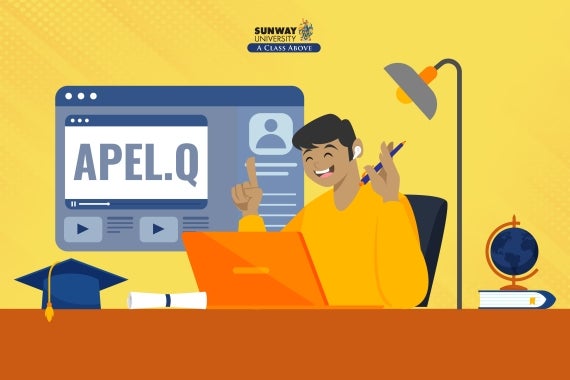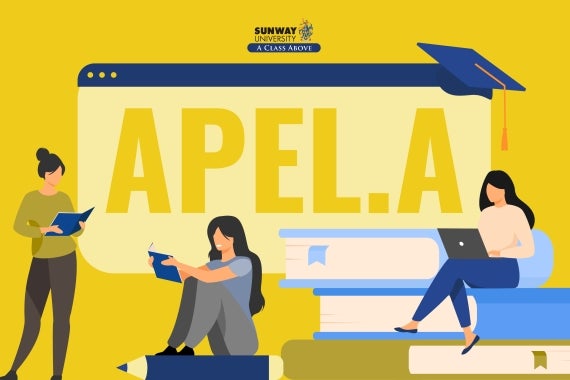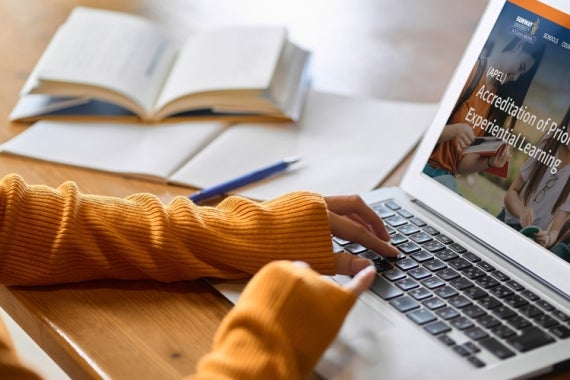APEL.C: Your Pathway to Graduate Faster

The journey to higher education has many paths. While most students take the traditional route, it’s worth knowing that there are alternative pathways such as APEL that help you achieve your education goals by leveraging the knowledge you’ve gained through prior informal learning and work experience – including by transforming this experience into graduating credits.
Towards this end, the Malaysian Qualifications Agency (MQA) has introduced APEL.C (Accreditation of Prior Experiential Learning for Credit Award).
What is APEL.C?
APEL.C is a process that evaluates an individual’s formal and informal learning experiences, including life and work experiences, that are relevant and specific to a course within a programme of study, and converts them into graduating credits, allowing you to complete your programme faster.
The credits awarded are ungraded, meaning the APEL.C mechanism does not involve the transfer of grades and does not contribute to the calculation of GPA and CGPA grades. It is also not applicable to final-year projects and dissertations.
The maximum percentage for credit award through APEL.C is 30% of the total graduating credits of a specific programme of study.

Benefits of APEL.C
APEL.C offers many advantages for individuals seeking to advance their academic qualifications, including:
✔ Save Time and Money
By receiving a credit award, you can complete your programme of study faster and eliminate potential redundant learning. This also means you get to save on overall tuition fees.
✔ Recognition of Prior Learning
APEL.C officially validates your valuable professional skills and knowledge, as well as learning gained through informal means – all while providing you with the opportunity to secure a tertiary-level academic qualification.
✔ Improved Career Opportunities
A higher-education qualification, coupled with your existing work experience, can open doors to better career prospects and higher salaries.
✔ Flexibility
Recognising the diverse learning backgrounds and experiences of APEL.C candidates, different assessment methods are used in the APEL.C assessment process to validate the achievement of candidates’ learning outcomes.
Who Should Apply for APEL.C?
APEL.C is a suitable option for a wide range of individuals, including:
- Professionals with work experience relevant to a specific programme of study
- Individuals who have undergone training or workshops that align with programme learning outcomes
- Those with demonstrable skills and knowledge acquired through non-formal and informal learning
There is no specified age limit for APEL.C candidates. However, candidates must be registered as students at a Malaysian university pursuing a programme of study, and must be able to demonstrate the achievement of at least 50% of course learning outcomes.
APEL.C vs APEL.A vs APEL.Q vs APEL.M: What’s the Difference?
Other than APEL.C, MQA also offers the following APEL types:
- Accreditation of Prior Experiential Learning for Access (APEL.A)
- Accreditation of Prior Experiential Learning for Award of Academic Qualifications (APEL.Q)
- Accreditation of Prior Experiential Learning for Accumulation of Micro-credentials (APEL.M)
APEL.C recognises and awards you with credits for learning you have done by assessing your prior experience. You can earn up to 30% of your graduating credits for all levels of education if your work or learning experiences match the learning outcomes of your selected course. This could help you complete a programme of study faster.
APEL.A, meanwhile, provides those with work experience the opportunity to attain admission or access to a programme of study. Through an assessment of your formal education, as well as your past work and learning experiences, you can access 6 levels of qualifications, namely:
- Certificate
- Diploma
- Advanced Diploma
- Bachelor’s Degree
- Master’s Degree
- Doctoral Degree
There is also APEL.Q, which allows you to get an academic qualification using your extensive experience. Your experiential learning can be transformed into credits for an entire study programme via a series of assessment tasks, and you will only need to complete a capstone course from the programme curriculum.
Finally, APEL.M enables candidates who lack formal academic qualifications to enter a tertiary-level programme, but have attained the equivalent of at least 50% of graduating credits via unbundled micro-credentials, to gain admission into the programme. Upon admission, they need only complete the remaining credits not obtained via micro-credentials.
 How to Apply for APEL.C at Sunway University?
How to Apply for APEL.C at Sunway University?
A champion of lifelong learning, Sunway University provides an opportunity for learners of different age groups and from different study/work backgrounds to grow personally and professionally.
You are eligible to apply for APEL.C at Sunway University, recognised by MQA as an APEL assessment centre, if you:
- Are a local or an international student of Sunway University
- Have gained entry into Sunway University's programmes through either the conventional or APEL.A route
- Are undertaking courses, including those from postgraduate programmes, that are 100% coursework or mixed mode
Here is what the APEL.C process looks like:
1. Pre-Application
Candidates are required to complete the APEL.C Enquiry Form, which will be submitted to Sunway University's APEL Unit. An APEL Unit team member will contact candidates to provide a briefing on the APEL.C application process. The candidate will also be matched to an advisor, who is an expert on the course and its learning outcomes.
2. Application Process
The APEL.C candidate will first undergo a self-assessment to gauge their eligibility for the APEL.C method of credit award.
The self-assessment includes a report on the candidate’s prior experiential learning related to the course applied for, the furnishing of an updated curriculum vitae, and the completion of the Self-Assessment Form. This step will be guided by the advisor working with the candidate. If the advisor finds the candidate eligible for APEL.C and identifies the appropriate assessment approach for the candidate (either a Challenge Test or Portfolio Assessment), they will be asked to complete the APEL.C Application Form.
3. Assessment
For the Challenge Test or Portfolio Assessment, candidates must demonstrate that they have achieved at least 50% of each course learning outcome. The test will be administered online through Sunway University’s eLearn portal or physically.
A Challenge Test can be a written test, oral examination, and/or performance assessment, depending on the course's nature and discipline.
The Portfolio Assessment, on the other hand, requires the candidate to prepare a portfolio to demonstrate that the learning they have acquired is relevant and specific to the learning outcomes for a particular course. In addition, the candidate may be asked supplementary questions to substantiate the evidence submitted in their portfolio.
4. Results and Endorsement
Once the results are endorsed and the credit award approved, successful candidates will receive the allocated credit for the selected courses on their academic transcript.

APEL.C Frequently Asked Questions (FAQs)
What is APEL.C?
APEL.C is the process of assessing knowledge gained from informal or non-formal learning experiences, including work experience, life experience or even short courses, for the purpose of obtaining credit awards for courses in academic programmes at Higher Education Providers (HEPs).
How much time can I save by taking the APEL.C pathway?
This varies depending on the level of study you are pursuing. For example, if you plan to get a bachelor's degree, you can shorten the study duration by up to 4 semesters, or up to 1 semester for a master's degree.
Can I apply for APEL.C if I'm not currently enrolled in a programme?
No. APEL.C is designed for registered students at a Malaysian university offering the desired programme of study.
Is APEL.C only for Malaysian citizens or students who use the APEL.A route?
APEL.C is open to all students, including Malaysian citizens and international students, regardless of their method of admission to the programme of study.
Will I be required to sit for an exam in my APEL.C application?
You will be assessed either through a Challenge Test or Portfolio Assessment. Depending on the course's nature and discipline, the Challenge Test could be a written test, oral examination, and/or performance assessment.
How many credits can I get through APEL.C?
You get a maximum credit award of 30% of the total programme graduating credits through APEL.C.
Is there an age limit for the APEL.C application?
There is no age limit, as long as you are enrolled in a programme of study at an HEP.
What happens if my APEL.C application is rejected?
If you are unsuccessful in your APEL.C assessment, you will have to complete your course the traditional way. A candidate who fails the Challenge Test will not be allowed to submit a portfolio for assessment for the same course, and vice-versa. Re-attempt of the Challenge Test and re-submission of new evidence in the portfolio for the same course through APEL.C are strictly not allowed.
Can I appeal the APEL.C decision?
If you are unsatisfied with the APEL.C assessment results, you can submit a written appeal by completing the APEL.C Appeals Form.
Are there any fees associated with APEL.C?
Fees for APEL.C include:
|
Item |
Undergraduate |
Postgraduate (by coursework) |
|
Pre-application (pre-assessment) |
RM100 |
RM100 |
|
Registration + Assessment |
RM300 |
RM300 |
|
Credit transfer |
RM350/Credit hour |
RM500/Credit hour |
|
Total fee (if successful) |
RM1450 (3 credit hours)/ RM1800 (4 credit hours) |
RM1900 (3 credit hours)/ RM2400 (4 credit hours) |
|
Total fee (if not successful) |
RM400 |
RM400 |
|
Appeal |
RM100 |
RM100 |
All APEL.C fees are non-refundable.
Is there any support available during the APEL.C application process?
Universities offering APEL.C usually have dedicated advisors to guide candidates through the process. These advisors can assist with eligibility checks, portfolio development, and answering any questions that candidates may have.
What are the requirements for APEL.C application at Sunway University?
Click here to download Sunway University’s APEL.C Learners’ Handbook, containing information on requirements, the application process, and more.


 How to Apply for APEL.C at Sunway University?
How to Apply for APEL.C at Sunway University?


